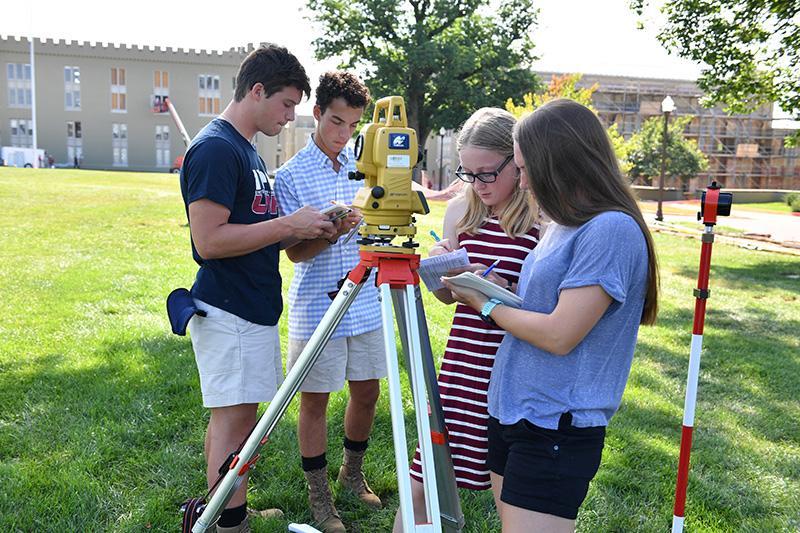STP Connects Student Learning to Real Life

STP students survey the Parade Ground July 19 as part of the civil and environmental engineering class taught by Maj. Paul Ackerman '93.—VMI Photo by Kelly Nye.
LEXINGTON, Va., July 31, 2018—Ongoing at VMI for over three decades now, the Summer Transition Program allows incoming rats to get acquainted with post, take an academic class, and break in the shoes and boots they’ll be wearing in the fall. While the structure of the program doesn’t change much from year to year, the course offerings do, and this summer, there were two changes to STP programming, both with the goal of connecting students’ learning to the real world.
Cadets in the surveying class taught by Maj. Paul Ackerman ’93, assistant professor of civil and environmental engineering, found themselves going off post to Lime Kiln Theater, a popular concert venue near Lexington, to conduct a topographical survey for potential grading that would allow for an expansion of seating. It was the first time that participants in the civil engineering STP class had done a real-world surveying project.
“We mostly work on the Parade Ground,” said Ackerman, who taught the surveying class for the fourth time this summer.
This year, though, there was a request from Lime Kiln for assistance. Two civil engineering majors—Zachary Pokrywka ’18 and Corris Atkins ’18—had already completed an independent study in the spring that involved surveying at the theater, so the 18 soon-to-be cadets in Ackerman’s class built off of their work.
“It was a hands-on, real world project that cadets could really engage in,” Ackerman noted. “They loved it.”
Ackerman also pointed out that projects such as this allow cadets to give back to the community—and that the work at Lime Kiln was almost tailor-made for cadet participation. “It’s a small enough project that we can get cadets involved in,” he stated. “It’s close enough that cadets can access, and it’s a nonprofit that really adds to the likeability of Lexington. It’s enjoyed by the community.”
In Mallory Hall, home to VMI’s applied mathematics department, STP participants enrolled in Math 101 found themselves trying out a new curriculum for the very first time. Under development for the past two years, Math that Matters—Math for the Modern World debuted this summer in a class taught by Lt. Col. Meagan Herald, associate professor of applied mathematics. The course is designed to teach computational and analytical skills by asking students to tackle real-world problems.
The 20 students enrolled in the course put their math skills to work trying to find out if cadets are becoming more or less fit over time, by comparing data between the 2007 and 2017 administrations of the VMI fitness test and taking into account that standards for the test have changed over time.
“It’s one of those open-ended questions that there’s not one answer to,” said Col. Troy Siemers, chair of the Department of Applied Mathematics.
Getting away from the sense that math problems only have one answer that is right or wrong is one of the goals of Math That Matters, Herald and Siemers agreed.
“By the end of the course, they’re comfortable with open-ended questions and defending their answers,” Herald noted.
The course was purposely interactive, with students working in groups or with partners almost all of the time. Answers were delivered by PowerPoint presentations or written reports. For the cadet fitness question, students were asked to write a letter to Gen. J.H. Binford Peay III ’62, Institute superintendent, outlining and defending their conclusions.
When asked, students said they’d enjoyed the class and gotten a lot out of it.
“I liked the group part of class,” said William Taylor. “It’s easier to get help in a group, and I learned better when I was helping others.”
Classmate Emma Flora agreed, saying, “Instead of just sitting and listening to lectures, we got to learn through a hands-on style. We got to be creative and write papers in math class.”
This year’s STP group numbered 215, up from 190 in 2017, said Capt. John E. “Ned” Riester ’78, who has directed the summer program for the past 13 years.
“We had a great group of kids and the [cadet] counselors were wonderful,” Riester commented. “It all went well.”
-Mary Price
-VMI-
.svg)
.png)